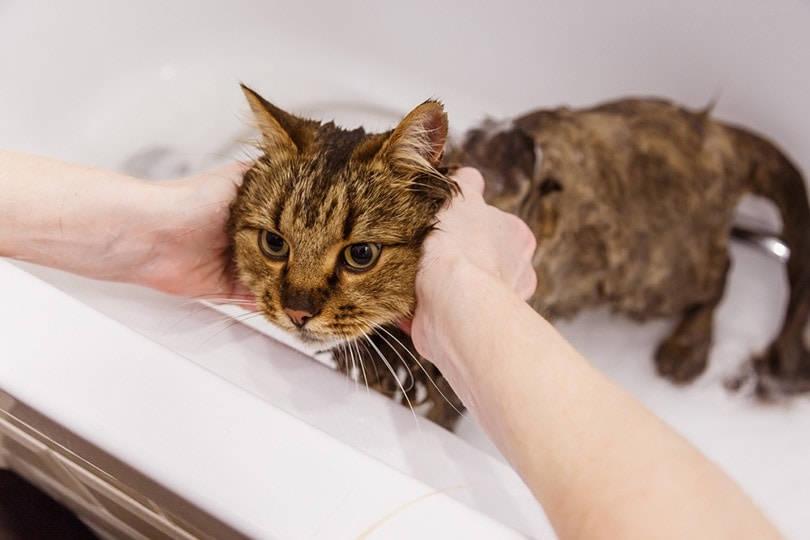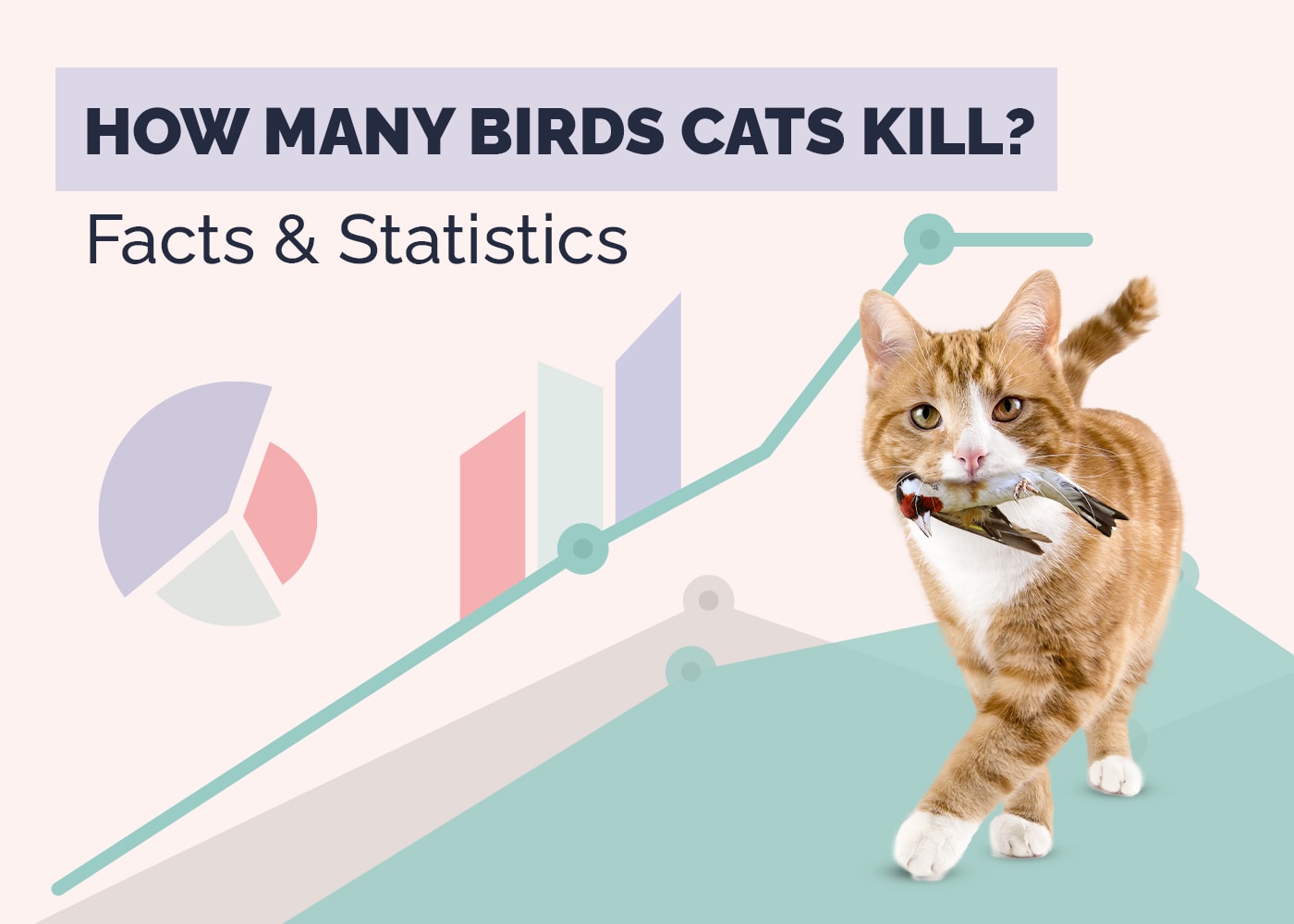Are Ladybugs Poisonous to Cats? Keeping Your Cat Safe
By Kit Copson
Updated on
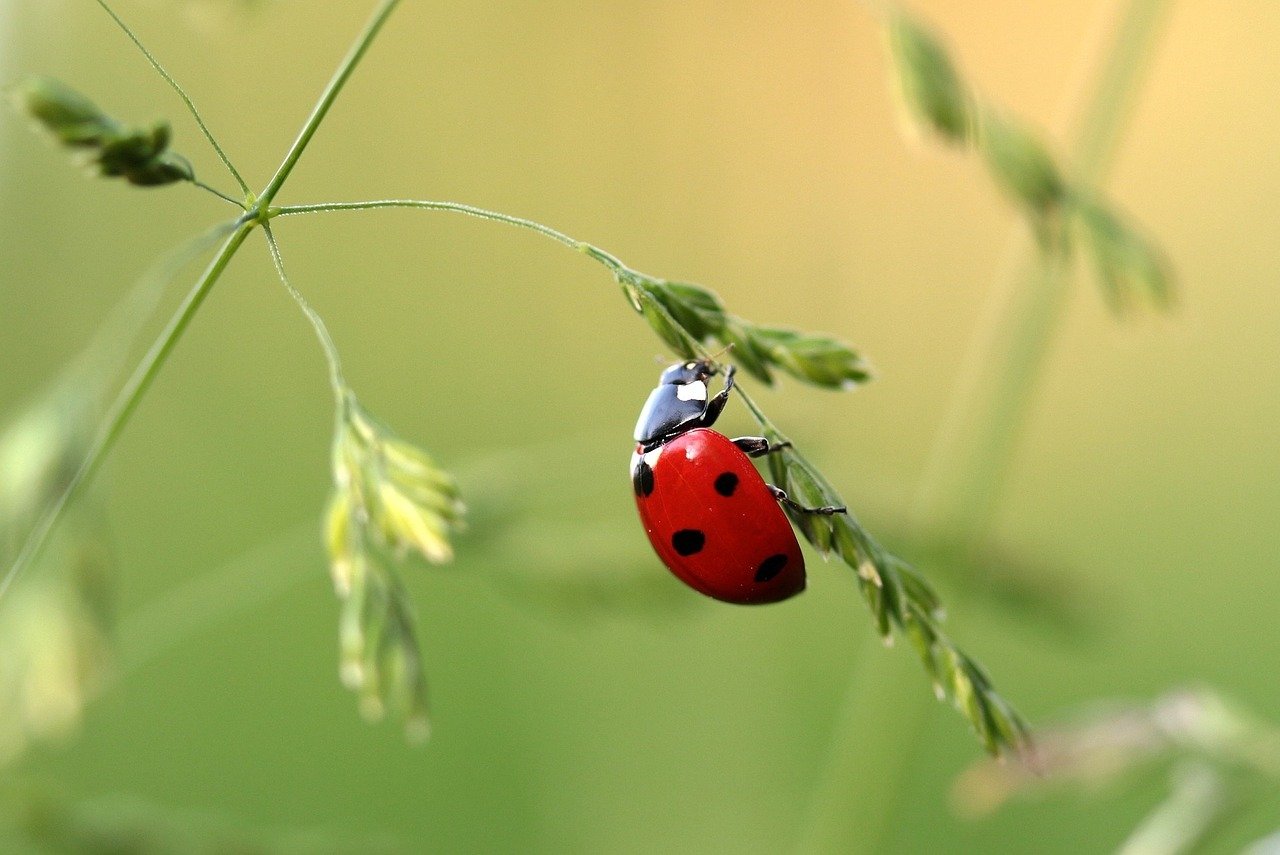
A cat’s fascination with ladybugs and other winged or six-legged beasts can be endearing. When frenzied chattering at a ladybug on the window becomes chasing and chowing down on one, however, it can be somewhat worrying for cat parents. So, what if your cat has eaten a ladybug? Take a deep breath and relax; if your cat eats a ladybug or two, it’s unlikely that any harm will come to them.
However, other ladybug varieties and insects may be harmful to cats. In this article, we’ll explore what happens if a cat ingests a ladybug and which insects are dangerous to cats.
 Are Ladybugs Poisonous to Cats?
Are Ladybugs Poisonous to Cats?
According to Dr. Laura Devlin, a veterinarian, ladybugs are only harmful to cats if consumed in large quantities. She explains that cats would have to ingest a large number of ladybugs for any ill effects like ulceration or stomach upset to occur. If a cat eats a ladybug once, they’re likely not to do it again since they taste pretty unpleasant.
Remember that while your standard, garden-variety ladybug is unlikely to cause serious harm to a cat, other ladybug varieties might, especially in large quantities. The ASPCA warns cat and dog owners to watch for Asian lady beetles, which look very similar to regular ladybugs.
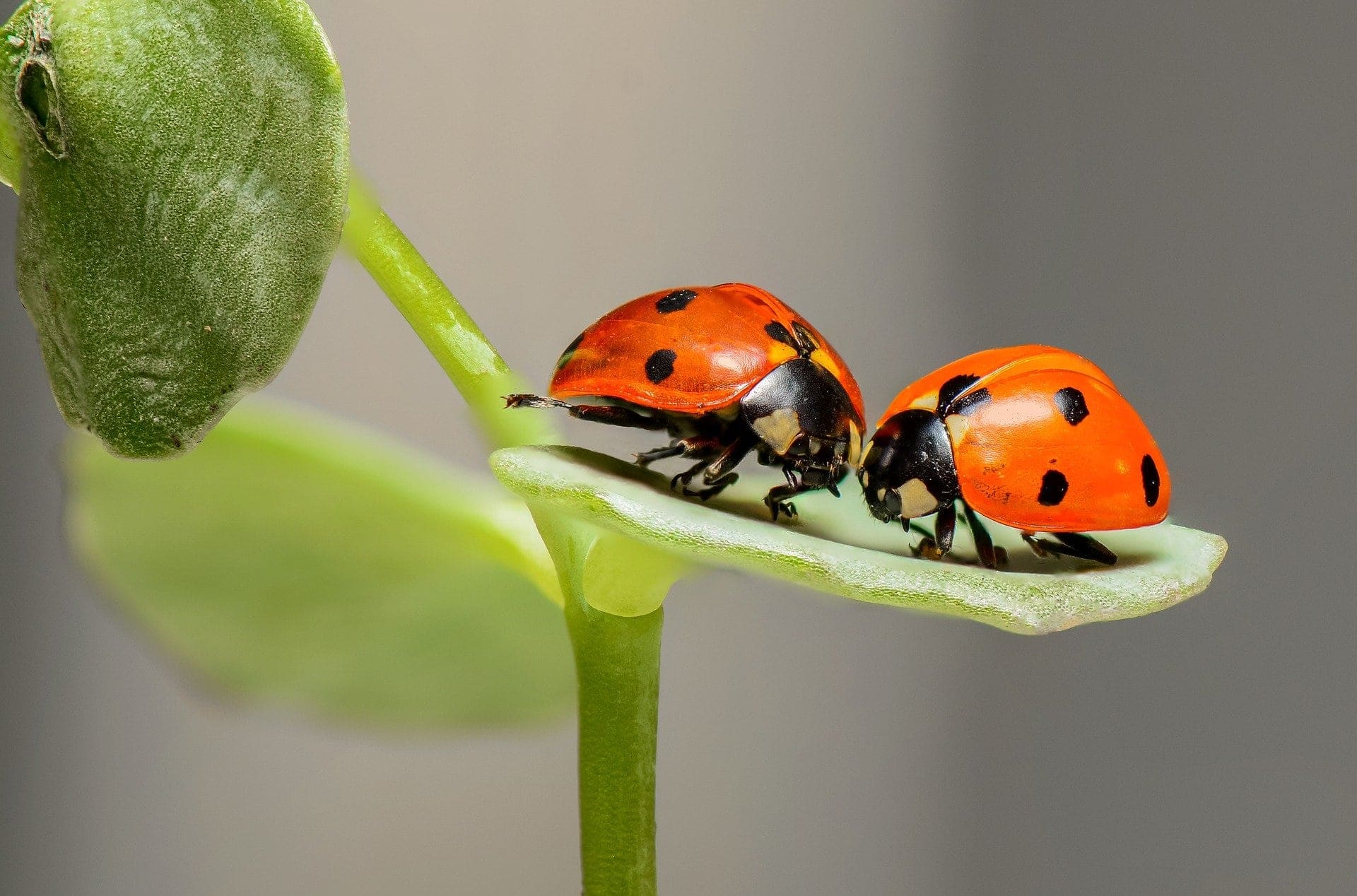
What Are Asian Lady Beetles?
The harmonia axyridis, also known as the Asian lady beetle, is similar in appearance to a ladybug but slightly larger. While regular ladybugs are bright red, Asian lady beetles are sometimes red and sometimes orange. This makes it so difficult to distinguish between the harmless ladybug and the more aggressive Asian lady beetle.
Ladybug VS Asian Lady Beetle: How to Spot the Difference
Ladybugs and Asian lady beetles have dark black spots, but if you look closely, you’ll notice that the Asian lady beetle has more of them. The Asian lady beetle also has a distinguishing white mark between the head and the body, which is similar to an “M” shape. It also has more white on its head than the common ladybug.
Ladybugs are great for your garden and are far less likely to infest your house than the Asian lady beetle. Asian lady beetles are known pests, most likely to invade your home in the fall and winter months. While ladybugs are generally harmless, Asian lady beetles bite and can harm pets, especially in large quantities.
What Happens if My Cat Eats a Ladybug?
It’s pretty rare for cats to consume large quantities of ladybugs or Asian ladybeetles. Most will find the taste so disgusting that they stay clear after eating just one. Also, ladybugs produce a horrible smell to put off would-be predators.
If your cat eats one or two ladybugs or Asian ladybeetles, it’s unlikely that any sinister side effects to occur. If eaten in large quantities, side effects can include ulceration in the mouth and signs of gastroenteritis. Asian lady beetles could also stick to the palate, meaning they must be removed by a vet.
If your cat doesn’t seem quite right after eating a ladybug or Asian lady beetle, it’s best to exercise caution and get them to a vet. While encounters like this are very uncommon, it’s still a good idea to remain vigilant and get Asian lady beetle infestations under control as quickly as possible. This is especially important if your pet has issues knowing when enough is enough and somehow remains immune to the foul taste.

What Insects Are Poisonous to Cats?
Most garden bugs are not poisonous to cats. Some insects, though, particularly stinging insects, can leave cats with a nasty swelling or worse. Let’s check out some common insects that can be dangerous to cats.
Bees and Wasps
If a cat is stung by a bee or wasp, the result could be a reaction similar to that in humans. Swelling, pain, and irritation around the area they’ve been stung may occur, but this usually clears up on its own.
Some cats are allergic to bees and wasps, just like humans. The worst-case result is an anaphylactic reaction requiring immediate veterinary attention.
- Vomiting
- Weakness
- Struggling to breathe
- Diarrhea
- Extreme swelling, especially on the face or limbs
- Hives
- Pale gums
Fire Ants
Like bees and wasps, fire ants are another insect that pets should be kept away from at all costs. These tiny yet aggressive insects are a problem in particular because they’re attracted to pet food. As a result, you can sometimes find them in their legions all over your cat’s food bowl. The sting of a fire ant can be excruciating and may require veterinary treatment.
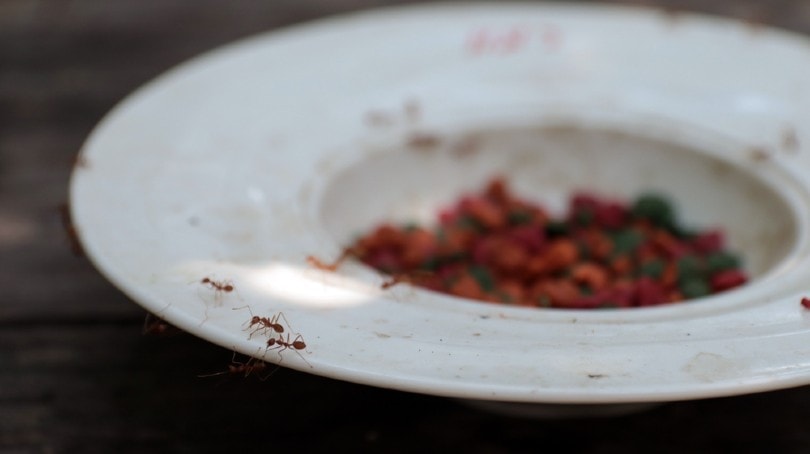
Caterpillars
These slow-moving, brightly-colored insects can be pretty intriguing for cats. In the rare instance that a cat eats a caterpillar, mouth irritation, drooling, gastritis, and esophagitis can occur. Fortunately, a cat’s coat helps protect them from rashes caused by caterpillar stings, but it can still happen.
In rare cases, the stinging hairs on a caterpillar’s body can get into a cat’s eyes. Although not every caterpillar is dangerous to cats, it’s a good idea to keep an eye out for irritant caterpillars in your garden.
Spiders
The good news is that most spiders are not harmful to cats. However, depending on where you’re located, your cat may come into contact with a spider that could cause serious harm. The black widow and brown recluse spider are species you should look out for around your cats. If you see your cat playing with a spider, remove them and watch for the side effects of a bite.
- Vomiting
- Skin that’s hot to the touch
- Redness
- Swelling
- Scabbing
- Itching
- Fever
- Bruising
In some cases, organ failure and death can occur. If you suspect a venomous spider bite, get your cat to a vet immediately for antivenom treatment.
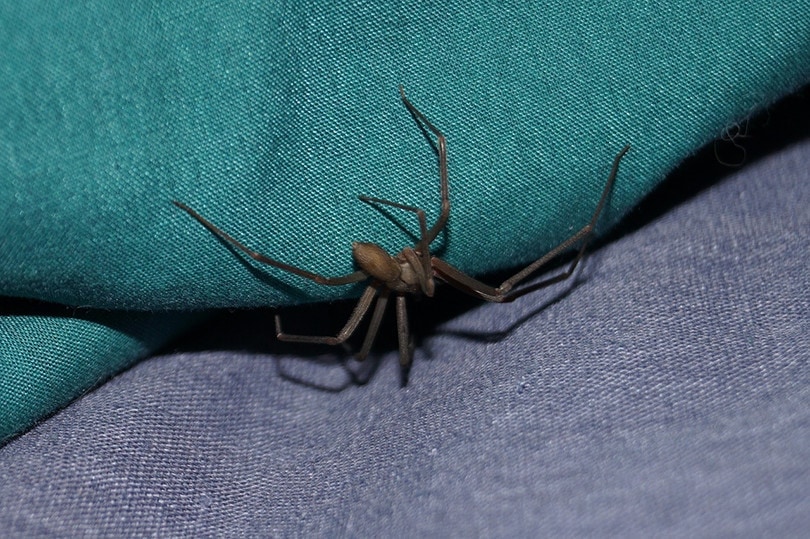
Stinkbugs
Though this insect’s name invites a giggle, the stinkbug can cause gastrointestinal issues for cats. Fortunately, it’s unlikely for serious issues to occur if your cat eats a stinkbug. They may experience vomiting or diarrhea as a result of the stinkbug’s secretions, however.
Are Insecticides Harmful to Cats?
Overuse of insecticides can cause overexposure, which can be toxic to cats. An example of how toxic poisoning in cats can occur is using insecticides on your lawn, making it possible for your cat’s paws to end up covered in the product. Another common cause is administering flea treatment meant for dogs.
The signs of toxic poisoning in cats include but are not limited to fever, vomiting, anorexia, muscle tremors, excessive salivation (drooling), and respiratory failure.
 Conclusion
Conclusion
To sum it up, ladybugs shouldn’t be too much of a concern regarding your cats because it’s pretty rare for cats to eat more than one or two, if at all. On the other hand, Asian lady beetles, bees, wasps, spiders, fire ants, and caterpillars can cause an unpleasant and even fatal reaction.
As with everything to do with our cats, vigilance is always best. Keep an eye out for the types of insects in your garden, and research any new insects you haven’t seen before to ensure they’re not harmful to cats. If you suspect your cat has eaten something they shouldn’t or is showing troubling signs, contact your vet immediately.
We hope you’ve found this post useful and feel much more confident about keeping your cat safe while they explore. Thanks, as always, for stopping by!
See also:
- Is String of Turtles Plant Toxic to Cats? Vet-Approved Facts & FAQ
- Do Cats Eat Bees? What You Need to Know
Featured Image Credit: Pixabay

 Are Ladybugs Poisonous to Cats?
Are Ladybugs Poisonous to Cats?